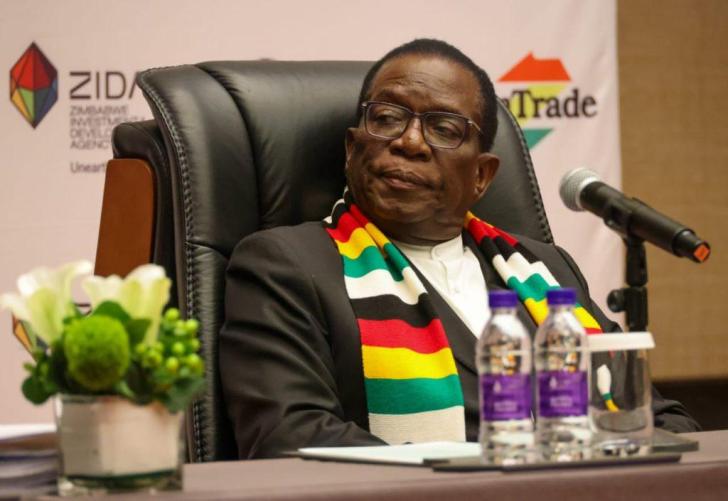News / National
Mnangagwa's govt blindsides title deed seekers
20 Sep 2024 at 07:00hrs |
0 Views

The government has reversed its earlier commitment to distribute title deeds to informal settlers, now requiring affected homeowners to undergo a formal application process. This shift comes after President Emmerson Mnangagwa's election promise last year to provide these documents, which many viewed as a campaign tactic.
Initially, the Cabinet endorsed the Kwangu/Ngakwami Presidential Title Deeds Programme Consortium as part of the initiative. However, President Mnangagwa only issued 265 securitized title deeds to select residents in Epworth, leading to frustration among many who were anticipating wider access.
In a recent parliamentary session, Housing and Social Amenities Minister Zhemu Soda admitted to delays in the title deed issuance, citing the complexity of the process. He announced the formation of a task force involving multiple ministries - including Local Government, National Housing, Lands, and Justice - to oversee the new application system.
"The Kwangu Trust has established a site office in Epworth where residents can submit their applications for title deeds," Soda explained. He noted that local authorities must first issue offer letters, and that even those who settled through cooperatives must have their ownership officially recognized.
Title deeds serve as formal legal documents that define property ownership and rights, yet many informal settlers remain without them, particularly in areas with a history of illegal land allocation. Accusations have surfaced against Zanu-PF-affiliated land barons, who are believed to have exploited desperate home-seekers by selling land unlawfully. This has led to the construction of homes on unsuitable land, including wetlands.
Corruption and disorder in land allocation have prompted arrests of local council officials and councillors, further complicating the situation. Soda stated that the government, in collaboration with the Kwangu Trust, aims to regularize illegal settlements while ensuring the issuance of title deeds, albeit with conditions that may include relocating some residents due to infrastructure requirements.
Justice Minister Ziyambi Ziyambi emphasized that the title deeds would serve to unlock value for infrastructural development, asserting that only properly identified beneficiaries would be issued titles. He described the government's goal as identifying and relocating beneficiaries from illegal settlements before proceeding with title issuance.
The issue of title deeds has been a longstanding concern for thousands of residents in peri-urban areas established on land taken during the tumultuous 2000 land reform program. A report by the Tendai Uchena commission in 2019 revealed that significant amounts of urban State land had been sold illegally, exacerbating the problem of unregulated settlements.
As of 2023, government statistics indicate that Harare Metropolitan province has approximately 52,000 houses built in illegal settlements, with a significant number located in Chitungwiza. Critics argue that the government's push to regularize these illegal structures is more about securing votes than addressing the underlying issues of land ownership and settlement legality.
Initially, the Cabinet endorsed the Kwangu/Ngakwami Presidential Title Deeds Programme Consortium as part of the initiative. However, President Mnangagwa only issued 265 securitized title deeds to select residents in Epworth, leading to frustration among many who were anticipating wider access.
In a recent parliamentary session, Housing and Social Amenities Minister Zhemu Soda admitted to delays in the title deed issuance, citing the complexity of the process. He announced the formation of a task force involving multiple ministries - including Local Government, National Housing, Lands, and Justice - to oversee the new application system.
"The Kwangu Trust has established a site office in Epworth where residents can submit their applications for title deeds," Soda explained. He noted that local authorities must first issue offer letters, and that even those who settled through cooperatives must have their ownership officially recognized.
Title deeds serve as formal legal documents that define property ownership and rights, yet many informal settlers remain without them, particularly in areas with a history of illegal land allocation. Accusations have surfaced against Zanu-PF-affiliated land barons, who are believed to have exploited desperate home-seekers by selling land unlawfully. This has led to the construction of homes on unsuitable land, including wetlands.
Corruption and disorder in land allocation have prompted arrests of local council officials and councillors, further complicating the situation. Soda stated that the government, in collaboration with the Kwangu Trust, aims to regularize illegal settlements while ensuring the issuance of title deeds, albeit with conditions that may include relocating some residents due to infrastructure requirements.
Justice Minister Ziyambi Ziyambi emphasized that the title deeds would serve to unlock value for infrastructural development, asserting that only properly identified beneficiaries would be issued titles. He described the government's goal as identifying and relocating beneficiaries from illegal settlements before proceeding with title issuance.
The issue of title deeds has been a longstanding concern for thousands of residents in peri-urban areas established on land taken during the tumultuous 2000 land reform program. A report by the Tendai Uchena commission in 2019 revealed that significant amounts of urban State land had been sold illegally, exacerbating the problem of unregulated settlements.
As of 2023, government statistics indicate that Harare Metropolitan province has approximately 52,000 houses built in illegal settlements, with a significant number located in Chitungwiza. Critics argue that the government's push to regularize these illegal structures is more about securing votes than addressing the underlying issues of land ownership and settlement legality.
Source - newsday
Join the discussion
Loading comments…









































